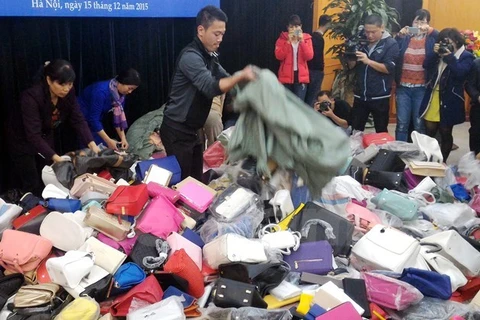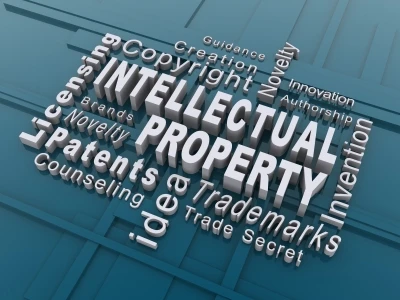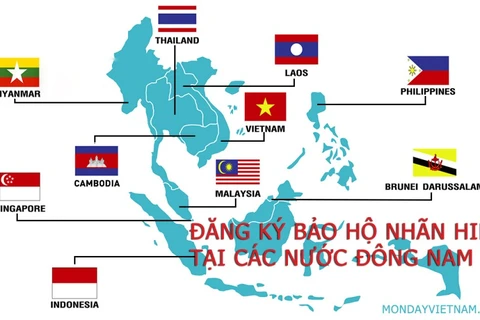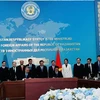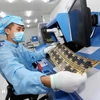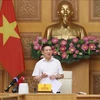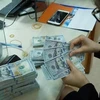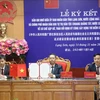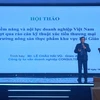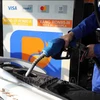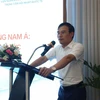 Market surveillance authorities inspect a confectionary workshop in Nam Dinh province (Illustrative image. Source: VNA)
Market surveillance authorities inspect a confectionary workshop in Nam Dinh province (Illustrative image. Source: VNA)Hanoi (VNA) - The infringement of intellectual property (IP), manufacturing and trading of counterfeit goods in Vietnam has become increasingly complicated with more sophisticated tricks being employed, but most violations were punished with administrative penalties.
Statistics from the Ministry of Science and Technology (MoST) showed that relevant forces have inspected and detected 25,966 cases of intellectual property infringement, fake production and sale, between 2012 and 2015. Of these, 25,543 cases have been levied administrative fines and 381 cases were prosecuted, with 553 arrestees.
Le Xuan Loc, a laywer from T&G Law Firm, said administrative punishments on IP violations are common as the procedure for settling in these cases occurs quickly and saves costs compared with other remedies, like civil or criminal ones.
However, he said, due to a lack of severe punishments, the administrative punishments do not achieve desired results.
Loc cited as an example the case of unhealthy competition relating to amway2u.vn domain. After the company owning the Amway trademark filed a request at the inspectorate of the MoST, the competent agency forced the violator to pay an administrative fine and return the domain. However, the violator refused to comply with the request.
According to Vu Xuan Binh from the Market Surveillance Department, under the Ministry of Industry and Trade, the department found 1,342 cases of IP rights violations and fake products in the first six month of 2016, which were slapped with total fines of 769 billion VND (345,000 USD). Confiscated goods were worth a total of 11.5 billion VND (515,000 USD).
Counterfeit goods infringing IP are produced not only in the country but also in foreign countries and are then brought back for domestic consumption, which cause serious impacts on consumers and the whole community. Fake goods include medicines, supplementary foods, building materials, and electrical appliances.
Binh pointed out inadequate punishments and manpower, and lack of coordination among enforcement agencies as major challenges in dealing with violations of intellectual property rights (IPR).
He said these issued must be tackled by strengthening the effectiveness of IPR enforcement which will result in more cases settled by criminal or civil remedies.
Relevant agencies should closely coordinate with each other to improve the legal framework, he said.
Pham Van Toan, deputy chief inspector of the Ministry of Science and Technology, said Vietnam was one of a handful of countries in the world that imposed administrative punishments on IPR violations.
Nguyen Huu Cu from the Economic Crime Investigation Police Agency said the agency found 286 cases of IPR violations (fake production and sale) in the first six month of this year, of which 49 cases have been prosecuted.
Cu attributed the low rate of prosecuted cases to the poor awareness of people on IPR regulations. They do not recognise the importance of product registration except for some foreign-related enterprises, thus, resulting in abuse of reputation.
He also blamed legal obstacles such as vague definitions used in the law relating to IPR for low enforcement through criminal remedies.
However, the official said the problem has been addressed in the Criminal Code 2015.
According to Nishiyama Tomohiro, chief advisor from Japan International Cooperation Agency (JICA), the JICA funded a project entitled Strengthen Effectiveness of Intellectual Property Rights Enforcement aiming to improve the capacity of manpower and coordination of agencies in handling IPR cases as well as raising awareness of the people about the harmful effect of IPR infringement. Then it would help eradicate fake goods in the market.
For example, if contraband goods are medicine, it will affect people’s health.
However, it takes a long time for consumers to understand and be aware of this issue, he said.
The forum was organised by the Intellectual Property Rights Department under the Ministry of Science and JICA.-VNA
